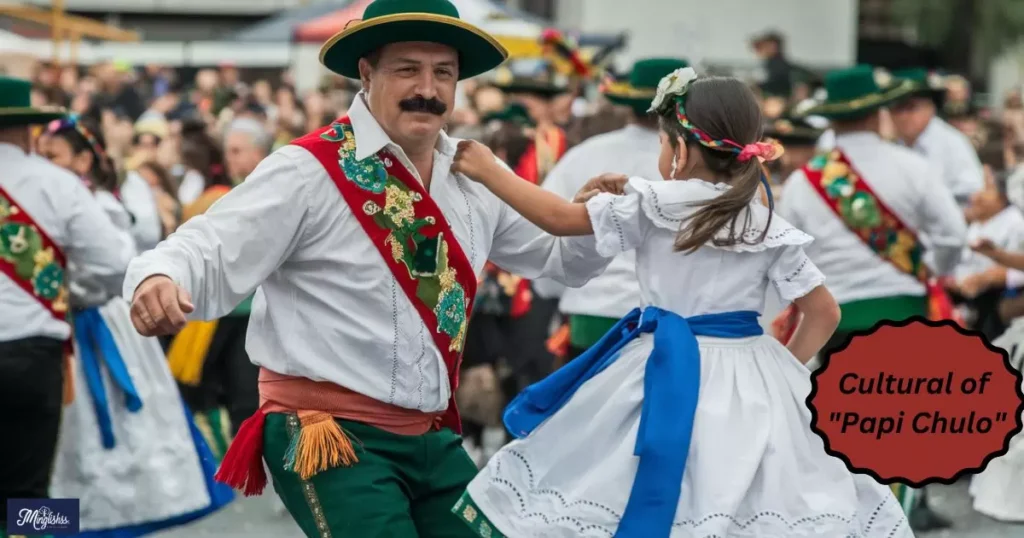The term “Papi Chulo” has become increasingly popular in various forms of media and everyday conversations. This catchy phrase has intrigued many, leading to questions about its true meaning and appropriate usage. Understanding such terms enriches our communication and helps us connect better with diverse cultures.
In today’s interconnected world, language plays a crucial role in bridging gaps between different communities. Slang terms like “Papi Chulo” not only add flavor to our conversations but also reflect cultural nuances that are essential to comprehend. Grasping the essence of such expressions can enhance our social interactions and make them more engaging.
This comprehensive guide will delve into the meaning, origin, and proper usage of “Papi Chulo”. We will explore its cultural significance, appropriate contexts, and even compare it with similar terms like “Mi Amor”. By the end of this article, you’ll have a clear understanding of how to use “Papi Chulo” effectively and respectfully.
What Does “Papi Chulo” Mean?
“Papi Chulo” is a Spanish slang term that has found its way into various languages and cultures. Literally translated, “Papi” means “daddy”, and “Chulo” can mean “pimp” or “cool” depending on the context. However, in colloquial usage, it often refers to an attractive man or ladies’ man.
In many Latin American countries, “Papi Chulo” is used as a term of endearment for a handsome or charismatic man. It conveys admiration and affection, often used playfully among friends or romantic partners. The term has also been popularized through music and movies, further embedding it into mainstream culture.
It’s important to note that while “Papi Chulo” can be a compliment, its appropriateness depends on the context and the relationship between the individuals involved. Understanding the nuances of this term helps in using it effectively without causing unintended offense.
The Cultural Origin of “Papi Chulo”

The phrase “Papi Chulo” has its roots deeply embedded in Latin American and Spanish cultures. It emerged from urban slang, primarily used in countries like Puerto Rico, Cuba, and Mexico. Over time, it has spread across different cultures through music, film, and social media.
In the early 2000s, the term gained international recognition through songs like “Papi Chulo… Te Traigo El Mmmm” by Lorna, a Panamanian singer. This song became a global hit, introducing the term to audiences worldwide. The catchy rhythm and repetitive use of “Papi Chulo” in the lyrics made it a memorable phrase that people started incorporating into their vocabulary.
Movies and television shows have also played a significant role in popularizing “Papi Chulo”. Characters using the term in dialogues have showcased its playful and affectionate connotations, making it more acceptable and widespread in everyday conversations.
Appropriate Contexts to Use “Papi Chulo”
Using “Papi Chulo” appropriately requires an understanding of the setting and the relationship between the speaker and the listener. Here are some contexts where the term can be used suitably:
Romantic Relationships
In romantic relationships, “Papi Chulo” can be used as a term of endearment for one’s partner. It conveys affection and attraction, adding a playful tone to the interaction. For example, a girlfriend might call her boyfriend “Papi Chulo” to express that she finds him attractive and charming.
Among Friends
Among close friends, especially within Latin communities, “Papi Chulo” can be used humorously to tease a friend who is being particularly charismatic or flirtatious. It adds a light-hearted element to conversations and strengthens camaraderie.
In Music and Entertainment
Artists often use “Papi Chulo” in songs to depict a confident and attractive man. Using the term in creative works like music, poetry, or storytelling can add cultural depth and relatability to the content.
It’s crucial to avoid using “Papi Chulo” in formal settings or with individuals who might not be familiar with its meaning. Misuse can lead to misunderstandings or be perceived as disrespectful.
Abbreviations for ‘Replacement’: Simplify Your Communication
Misconceptions and Misuses of “Papi Chulo”
While “Papi Chulo” is generally used in positive contexts, there are common misconceptions and misuses associated with the term. Understanding these can prevent awkward or inappropriate situations.
Associating with Negative Connotations
Some people might associate “Papi Chulo” strictly with its literal translation, linking it to “pimp” or other negative stereotypes. This misunderstanding can lead to the term being perceived offensively. It’s essential to be aware of the audience’s cultural background and knowledge before using it.
Overusing in Inappropriate Settings
Using “Papi Chulo” in professional or formal environments is generally inappropriate. Overusing the term or using it with people you’re not familiar with can come across as disrespectful or unprofessional.
Ignoring Cultural Sensitivity
Ignoring the cultural significance of “Papi Chulo” can lead to misuse. It’s important to respect the term’s origins and understand that it holds different meanings in various cultures. Being culturally sensitive ensures respectful and appropriate usage.
Comparing “Papi Chulo” with Similar Terms
To fully grasp the meaning and usage of “Papi Chulo”, it’s helpful to compare it with similar terms like “Mi Amor” and “Guapo”.
“Mi Amor”
“Mi Amor” translates to “my love” in English. It’s a common term of endearment used between romantic partners or close family members. Unlike “Papi Chulo”, which has a playful and sometimes flirtatious tone, “Mi Amor” conveys deep affection and love.
“Guapo”
“Guapo” means “handsome” or “good-looking” in Spanish. It’s used to compliment someone’s appearance straightforwardly. “Papi Chulo” carries a similar meaning but adds an element of charm and charisma beyond just physical attractiveness.
Understanding these differences helps in choosing the right term based on the relationship and context. While all these expressions are endearing, their appropriate usage varies depending on the situation and the individuals involved.
Where Does “MI AMOR” Come From?

The term “Mi Amor” has its origins in the Spanish language, widely spoken across Spain and Latin America. It’s a universal expression of love and affection, used to address someone dear to one’s heart.
Historically, “Mi Amor” has been a staple in Spanish literature, poetry, and music. Renowned poets like Pablo Neruda have used this term extensively to express profound emotions and romantic sentiments. Its usage transcends cultures, making it a popular phrase even among non-Spanish speakers.
In modern times, “Mi Amor” is commonly heard in songs, movies, and daily conversations, symbolizing love and deep affection. Its simplicity and universal appeal make it a favorite among people expressing their feelings towards loved ones.
Understanding the origin of “Mi Amor” provides insight into its significance and the depth of emotion it conveys. It’s a beautiful example of how language can capture and express complex feelings in simple yet powerful terms.
Suitable Ways to Use “Papi Chulo”
Using “Papi Chulo” appropriately enhances communication and ensures the term is received positively. Here are some suitable ways to incorporate this expression into your conversations:
Complimenting a Partner
When you want to compliment your male partner on his appearance or charm, addressing him as “Papi Chulo” adds a playful and affectionate touch. For example: “You look amazing tonight, Papi Chulo!”
Playful Teasing Among Friends
Among close friends, especially within Latin communities, you can use “Papi Chulo” to tease someone who’s acting particularly flirtatious or confident. For instance: “Watch out, here comes Papi Chulo ready to steal all the hearts!”
Creative Expression in Art and Media
If you’re a writer, musician, or artist, incorporating “Papi Chulo” into your work can add cultural richness and authenticity. It helps in connecting with audiences familiar with the term and introduces it to those who are not.
Casual Conversations in Informal Settings
In informal settings like parties or social gatherings, using “Papi Chulo” can add a fun and light-hearted vibe to the conversation. It’s a great way to break the ice and engage with others playfully.
Remember, the key to using “Papi Chulo” appropriately lies in understanding your audience and the context. Always ensure that the usage aligns with the comfort levels of the people involved to maintain respect and positivity in communication.
Answer to Key Question
What is the literal translation of “Papi Chulo”?
The literal translation of “Papi Chulo” is “pimp daddy”. However, in colloquial usage, it typically refers to a handsome or attractive man and is often used as a term of endearment.
Is “Papi Chulo” considered offensive?
In most contexts, “Papi Chulo” is not considered offensive and is used playfully or affectionately. However, its appropriateness depends on the context and the relationship between the individuals involved. It’s important to be mindful of the setting and the audience’s cultural background.
Can women use the term “Papi Chulo”?
Yes, women can use “Papi Chulo” to refer to men they find attractive or charming. It’s commonly used by women as a term of endearment for their partners or even playfully among friends.
Is “Papi Chulo” used only in Spanish-speaking countries?
While “Papi Chulo” originates from Spanish-speaking countries, its usage has spread globally through music, movies, and social media. People from various cultural backgrounds now use the term, especially in informal and playful contexts.
Are there female equivalents to “Papi Chulo”?
Yes, a female equivalent to “Papi Chulo” is “Mami Chula”, which is used to refer to an attractive or sexy woman. Like “Papi Chulo”, it’s used as a term of endearment in informal settings.
How has pop culture influenced the usage of “Papi Chulo”?
Pop culture has significantly influenced the widespread usage of “Papi Chulo”. Songs, movies, and social media have popularized the term, making it a part of everyday vocabulary in various cultures beyond its original Spanish-speaking audience.
Conclusion
Understanding the meaning and usage of terms like “Papi Chulo” enriches our communication and helps us connect better with diverse cultures. This term, rooted in Latin American and Spanish cultures, has transcended boundaries through music and media, becoming a popular expression worldwide.
When used appropriately, “Papi Chulo” adds a playful and affectionate tone to conversations. It’s essential to be mindful of the context and the audience to ensure the term is received positively and respectfully. Comparing it with similar expressions like “Mi Amor” and understanding its cultural significance enhances our appreciation of such vibrant linguistic elements.
Language is a powerful tool that reflects and shapes our interactions. Embracing and understanding diverse expressions like “Papi Chulo” not only broadens our linguistic skills but also fosters cultural awareness and sensitivity. So the next time you hear or wish to use “Papi Chulo”, you’ll do so with confidence and understanding.

Hi, I’m Isabel: I’m passionate about turning language learning into a fun adventure. I believe in making every word exciting and memorable.










